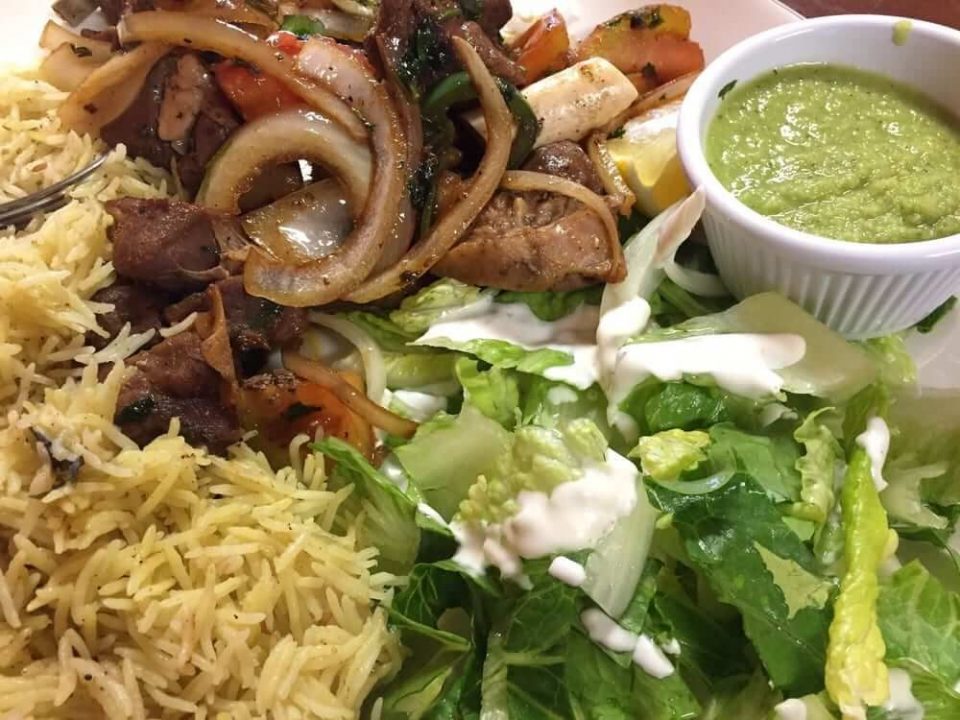An estimated 12,000 to 15,000 Somali’s living in the Seattle area reside in apartments in the Rainier Valley, in Kent, Tukwila and in SeaTac. So this is where, therefore, a handful of Somali groceries have sprouted up in recent years: its freezers stocked with goat meat; its shelves full of basmati rice, lentils, fava beans, fruit juice and pita bread.
Somalis are, like all immigrant groups, adaptive and resourceful. And because they are a relatively recent refugee group, having fled a horrific civil war and famine in 1991 and only beginning to settle in Seattle in the last five years or so. Somalis here generally eat the sorts of foods they are used to from home – and make do, without complaint, when they can’t consume the items they’d really like to find in the U.S.

One of these preferred items is camel, both as source of calcium (its milk) and of protein (its meat). Camel milk, Somalis believe, is the most nutritious of the animal milks they drink – which also includes goat and cow. Although infants are breastfed up to the age of two, Somalis in their native land would also feed camel milk to children. Adults also regularly drink the milk and some Somali adults are apt to point to the tallest members of their families as proof of the tremendous advantage camel milk holds over other milk.
Since many Somalis are nomads, back home they often ate a popular type of jerky called otka – preferably camel meat that is dried and then fried in butter and spices. Its preparation allowed the meat to be preserved for a long time, which made it ideal to take on long trips.
Local Somalis say it is impossible to find camel meat or camel milk here in the U.S., although they have tried. But goat meat – usually bought frozen as an Australian import – can be bought in Somali grocery stores. Somalis prefer shopping in their own stores for goat meat because they say when they have found goat in other markets and taken it home, it usually tastes too fatty and much too similar to lamb.
The overriding characteristic of the Somali diet is that it’s diet of halal foods (halal is Arabic for “allowable” as opposed to haram, which means prohibited). Somalis are Sunni Muslems and under Islamic Law (or Shar’iah), they are prohibited from eating pork, drinking alcohol or smoking cigarettes. Meat consumed by Somalis, therefore, is similar to kosher meat in that it has been slaughtered in a specific way as prayers are recited. Somalis say there are two places in Auburn where they are allowed to butcher animals so the meat is halal. And while some Somalis said they rely on Somali grocers for most of their food, they also note that local Safeways or QFCs carry halal foods as well. The concept of what is “healthy” food versus what is “junk” food does not seem to carry much weight in the food choices Somalis make. Rather, as long as the food is halal, the meal is OK.
Somali meals, generally always cooked by the women, are meat driven. (Vegetarianism is relatively rare). Goat, beef, lamb and sometimes chicken is fried in ghee, or grilled or broiled. It is spiced with turmeric, coriander, cumin and curry and eaten with basmati rice for lunch, dinner and sometimes breakfast. Ground meat cooked with tomato sauce is served over spaghetti. “Ninety-eight percent of Somalis eat meat, rice and pasta,” one local grocer explained. Eating fish, apparently, isn’t very popular.
Vegetables appear to largely be side dishes, and often are woven into a meat dish, such as combining potatoes, carrots and peas with meat and making a stew. Green peppers, spinach and garlic were also noted as the types of vegetables most commonly eaten. Bananas, dates, apples, oranges, pears and grapes are among some of the more popular fruits (a raw, sliced banana is often eaten with rice). But in Somalia, Somalis had a much larger selection of fruits – like mango and guava – from which they would make fresh juice. Somali stores, therefore, carry among the widest selection of fruit juices, both Kern1s juices as well as imports from India and Canada. And there is also a selection of instant juice: frozen or available as a powder.
Other common foods include a type of homemade bread called anjara (it looks like a large, spongy pancake); black tea sweetened with milk and sugar; and sambusas, which are deep-fried triangular-shaped dumplings usually filled with meat or vegetables.
Like all Muslims, Somalis are required to fast from eating or drinking from dawn to dusk during the ninth month of the Muslim calendar known as Ramadan. Anyone in good health over the age of 15 is required to fast, but if girls are menstruating, they are exempted from fasting during their cycle.
While fasting is obligatory during Ramadan, fasting is also practiced among Somalis at any time of the year they want more spiritual purification. Many Somalis fast for one day or more at least every month.

